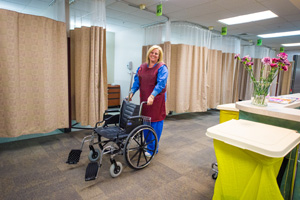Before you Arrive
Surgery Preparations
Prior to Your Day of Surgery:
- If you are on medication, please check with the surgeon prior to your appointment to see whether you should take it the night or morning before your surgery.
- If you have any health concerns prior to your day of surgery, such as elevations in temperature, a rash, cold or cough, contact your surgeon or the surgery center immediately.
- If you suspect that you are pregnant, contact your surgeon; medications may be harmful to your developing child.

On the Day of Your Surgery:
- Shower or bathe to minimize the chance of infection.
- Do not smoke
- Do not wear make-up
- Wear loose, comfortable clothing to avoid pressure on your surgery site.
- Wear flat, preferably slip-on shoes.
- Wear glasses instead of contact lenses.
- Leave jewelry and valuables at home.
- Do not eat or drink anything after midnight before your procedure. This is vitally important, and failure to comply could result in health complications and/or cancellation of your procedure.
What to Bring with You:
- A photo ID (i.e. driver’s license, state issued ID, passport)
- Insurance or Medicare card
- Insurance co-pay or deductible payment unless prior arrangements have been made
- Arrange for someone (over the age of 18) to drive you home and stay with you for 24 hours
- Bring a list of the medications you are currently taking. We will ask you about any allergies you might have.
- If appropriate, bring insulin or your inhaler with you.
- For young children undergoing surgery, please bring a comforting toy, blanket, pacifier or bottle (for after surgery).
- All minors, under age 18, must have a parent or legal guardian with them. Legal guardians must provide appropriate documentation.
Visitor guidelines:
Visitors should not enter if they are ill, or have experienced any of the following signs or symptoms in the last 10 –14 days: Sore throat, congestion or runny nose, cough, fever (100.4°F/38°C) or chills, shortness of breath or trouble breathing, fatigue, headache, nausea/vomiting/diarrhea, new loss of taste or smell, rash.
- One (1) adult visitor may accompany an adult patient
- Two (2) adult visitors may accompany a minor patient (under age 18)
- Visitors under the age of 17 are not permitted in the building
 After Your Surgery:
After Your Surgery:
- After your surgery, a friend or family member may join you in the Phase II recovery area.
- When you are fully awake and alert, a staff member will go over specific instructions for your at-home care, and you will be discharged.
- To be discharged, you must have a driver. You will not be released to drive yourself home if you have been given general anesthesia, sedation or pain medication.
Disclaimer: If you are viewing in Internet Explorer 8 or older you may need to update your browser by Clicking here.


